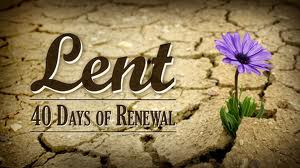
Dear wife Dee and I were visiting in Missouri – a babysitting trip we make to take care of our younger ‘grands’ in Springfield suburb. Our daughter, a single mom has a mandatory annual business conference she is a big part of helping with. And we enjoy the opportunity to visit with the two youngest and to cook meals, take them to soccer or basketball or cheerleading or whatever is happening during our visit. Sad to say we are 1,100 miles away and we only get to see the family one or two times a year. Okay – that’s the lead-in to this reflection on Lent.
We went to a Saturday evening Mass of anticipation at the St. Joseph the Worker parish closest to the home where we are visiting. As we walked into the gathering area, there were several things for us to see or take in. One of these was a display board with good quality pictures and the names of those at the parish who were in their RCIA (adult faith formation) classes, studying for entry into the Catholic Faith at the Easter Vigil. There was the invitation to pray for them and spiritually accompany them on their journey to Catholicism.
This led me to recall that there is a close connection between Lent and baptism. When Dee and I were in Italy, we visited in some cities where there were physically separate buildings close to the duomos (the big churches). The separate building had no altar, but which was filled with paintings and ancient frescoes. These buildings were used by those in the catechumenate — catechumens studying the paintings and images to learn the basics of our faith. Recalling that a thousand years ago and more, there were no books as we know them, and the murals were the books that poor lay people were taught from. At the Easter Vigil – these candidates would be brought into Catholicism just as is done with the majority of adults these days. 
The idea of knowing… perhaps spiritually adopting catechumens is, I believe a different form of Lenten practice. It is so unfortunate that what Lent triggers in many of us is the idea of ‘giving up something,’ when in fact we ought to consider adding to our faith walk. And so – my first different idea for your consideration as we enter Lent is to find out who is in the RCIA program in your parish and see if, at least, you can be a prayer partner for them. But wait — there’s more 🙂
Related to this – I was just in touch with Catholic evangelist and author Gary Zimak – a previous guest on our Catholic Vitamins podcast. Gary made a point of sharing (on Facebook) what a great and powerful RCIA class he had attended in his parish. When I questioned him about what happened that was so powerful, he shared about a young woman in RCIA who is engaged to a Catholic fellow. The young woman was at a Saturday evening party, and she started to leave early. Several of the attendees questioned her about why the early departure. She told them that she wanted to get a good night’s sleep so she could get up for Mass and for her RCIA class. Some of the so-called Catholics started to joke with/at her saying they didn’t always go to Mass. They suggested that was old-fashioned thinking. The young fiance held her ground and shared all this at her RCIA class. Her classmates and those leading the class gave her a standing ovation. Gary Zimak said that they spoke about how the world will always try to influence against the practice of our faith – even those who profess the name Catholic or Christian.
You could have been a witness to this exchange and had your faith enhanced by the young woman’s witness. And perhaps you could have been a Lenten journey mate by reinforcing her decisions made at the party.
What else could we do which would be other approaches to Lent? I am sort of hooked on faith-conversion stories. I find in them tender and inspiring examples of God’s grace working in the lives of Protestants and unbelievers alike. Some time ago, I was blessed to interview a former Episcopal priest, now a married Roman Catholic priest named Fr. Doug Lorig. He is the pastor of Maria Goretti parish in Scottsdale, Arizona. His story was one of an early and deep faith relationship with Blessed Mother Mary. His story includes day-off visits to a Catholic church where then pastor Doug would quietly pray to Jesus and His Mother. His journey of separation from his Episcopal priesthood, his loss of salary and benefits and free automobile to a low-paying teacher position and then to a delayed admittance into the Catholic faith and ultimately restoration to the priesthood — all this makes for a beautiful story of what it means to accept the faith and to be willing to anything to live it to the fullest. If you are inclined to listen to the interview I did on our Catholic Vitamins podcast – here is a direct link for use on your computer:
http://catholicvitamins.com/catholic-vitamin-u-union/
I might also share with you that Fr. Doug’s parish had copies of the DVD which has the video version of Father’s visit to the Marcus Grodi Coming Home TV program on EWTN. It’s a fuller, richer telling of Doug’s journey.
And so, in summary of this point – I recommend you consider adding faith conversion stories to your Lenten practice. And the interesting thing is that I’ve even found them in my own parish. One fellow I’ve recently befriended is a former Assembly of God pastor. He was in that church for something like twenty years. It was so powerful to learn how and why he became a born-again Christian.
I previously mentioned this notion of giving up things for Lent. In the early Church, as those readying to enter the faith, the candidates would fast for some number of days. It is likely this is the under-girding of our modern thoughts of giving up favorite items such as chocolate or candy or booze or such. In those early days of almost 2,000 years ago, and now in our modern times, fasting was a way to accompany the soon-to-be new Catholics.
As a new idea for you, would you consider sitting in on evenings of RCIA classes — giving up your evenings to be a better faith-co-walker with the catechumens? This is a doubly beneficial Lenten practice because it will help renew you in faith teachings as well as demonstrating your commitment to the candidates.
A lot of us were raised or formed to think of Lent as a desert experience. There may be merit to the idea of stripping ourselves bare of attachments — but Lent is really meant to be a period of conversion of heart. A deeper conversion of heart.
Would you be willing to consider a different approach to your Lent? Take it to prayer and I’d like to know how you feel at Easter regardless of what approach you choose.
Blessings.
Deacon Tom
Leave a Reply